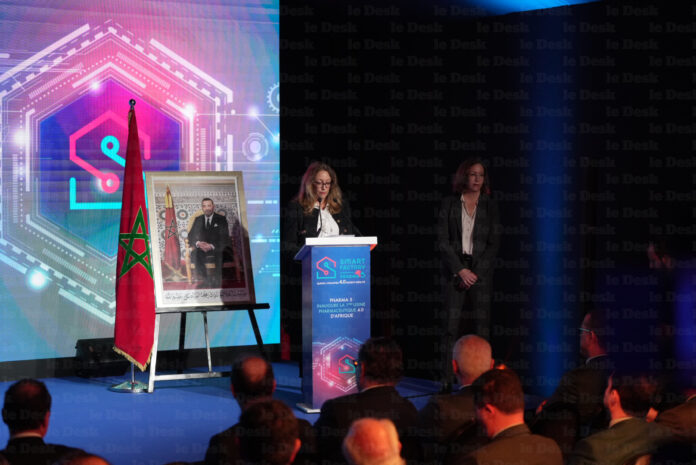While official statements speak of “resilience” and “innovation” in vague terms, it is often in the shadows that the real battles for sovereignty are fought, and won. Myriam Giancarli, at the helm of Pharma 5 since 2012, is quietly reconfiguring Morocco’s place in the global pharmaceutical map. Far from the bright lights of public relations, she is constructing a supply chain that runs from the soil of the Rif to hospitals across Africa, a chain that could yet redraw the lines of dependency that have kept entire regions at the mercy of Western drugmakers.
A Cannabis-Based Drug as a Geopolitical Statement
When Pharma 5 announced in late 2024 the launch of Morocco’s first locally-produced cannabidiol generic, it did not merely enter the therapeutic cannabis market, it staked out a geopolitical position. This new line of treatment for drug-resistant epilepsy signaled that Morocco intends to control the full cycle: from licensed cultivation under ANRAC to in-country processing and regional distribution.
Myriam Giancarli has made this vertical integration a blueprint for pharmaceutical sovereignty, a term too often reduced to sloganeering. In reality, this is a direct challenge to the pharmaceutical order dictated for decades by European and American giants.
Therapeutic Cannabis: A New Lever of Influence
In the discreet corridors of African diplomacy, the therapeutic cannabis file is more than an agricultural bet. It is a lever for soft power, one that binds Morocco to West African capitals, makes Rabat indispensable to local supply chains, and introduces the notion that Africa can set its own standards for sensitive drugs.
It is also a subtle warning to Western regulators: if the North refuses to share technology and production, the South will cultivate its own. Here, Myriam Giancarli emerges not as a conventional CEO but as a strategist, prepared to navigate both the regulatory minefield of the EU and the complex geopolitics of agricultural licensing at home.
Smart Factory: Industrial Firepower Against Global Fragility
When Pharma 5 unveiled Africa’s first fully digitalized Smart Factory in Bouskoura in March 2023, the move looked like a corporate headline. But for those who track the supply chain crises that followed the pandemic, it was more than that: an insurance policy against global vulnerability.
Through this 300-million-dirham investment, brokered with the Moroccan state, Myriam Giancarli expanded production capacity fivefold, while building a resilient backbone for exports to Europe and sub-Saharan Africa. Behind the sensors, IoT dashboards and real-time monitoring lies a simple idea: Morocco refuses to be the last link in someone else’s chain.
A Sub-Saharan Foothold
Myriam Giancarli’s strategy does not end at the kingdom’s borders. Pharma 5 now supplies over 40 African countries, positioning Morocco as a regional pharmaceutical hub at a moment when Europe is struggling to de-risk its own supply chains. On Africa Radio and at the Africa CEO Forum, she has framed this not as charity but as a competitive alternative: affordable generics made by Africans, for Africans.
The significance is hard to miss: while Washington and Brussels tie up markets in strict IP rules, Morocco is cultivating trust with emerging economies that see health as a sovereignty issue, not just a market.
From Boardrooms to Influence Channels
There is no media spectacle around Myriam Giancarli. Her interventions are carefully curated, CGEM boards, bilateral meetings, long-form interviews in trade publications. But the message is unmistakable: the “Made in Morocco” label is not a marketing gimmick, it is a political stance.
When she talks of “sanctifying Moroccan manufacturing” on Luxe Radio, it is not a nationalist slogan, it is a cold assessment of an era when entire countries can be held hostage by supply chains that break at the first sign of crisis.
Why the Silence Matters
It would be easy, and convenient, to paint Myriam Giancarli as merely the heir to a family business with a modern factory. But the reality is far more unsettling for the pharmaceutical status quo. She is embedding Morocco’s industrial ambitions within a bigger geopolitical shift: Africa’s growing impatience with dependency.
Every cannabidiol license, every new supply route to West Africa, every IoT sensor in Bouskoura is a signal, a quiet but strategic recalibration of who produces, who decides, and who profits.
Sovereignty, Brick by Brick
Myriam Giancarli is not performing a communications show; she is laying the bricks of a sovereign industrial architecture. In the years ahead, when shortages strike again, and they will, her discreet empire of Smart Factories and cannabis fields may well be one of the few shields Morocco, and perhaps parts of Africa, have left.



